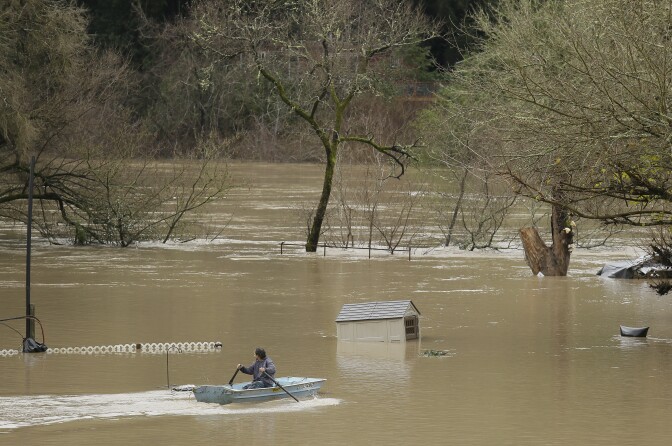This story is free to read because readers choose to support LAist. If you find value in independent local reporting, make a donation to power our newsroom today.
This archival content was originally written for and published on KPCC.org. Keep in mind that links and images may no longer work — and references may be outdated.
Proposed federal water bill would streamline new dam projects

Decades of planning for dams that could capture storm runoff in parts of Northern California has yet to lead to the building of such structures, a situation a Central California congressman hopes to change with a new bill that would cut through existing legal requirements and environmental regulations.
Republican Congressman David Valadao is the bill's sponsor. His district includes the farms visible along Interstate 5 from Bakersfield north for 160 miles. Those farmers want water, and his new bill, HR 23, is designed to streamline the dam approval process.
The bill, which Valadao has dubbed the GROW Act, an acronym for Gaining Responsibility on Water, would put the federal Bureau of Reclamation in charge of coordinating local, state and federal permitting of new dams.
The bill would also impose deadlines to finish feasibility studies on proposals for the Sites Dam along the Sacramento River, and the Temperance Flat Dam along the San Joaquin River. Valadao was not available to answer KPCC's questions about the bill, and members of his staff declined to be quoted about it.
Ron Stork, policy director for the environmental group Friends of the River, has been tracking progress on the Temperance Flat dam project. He said the new bill reworks HR 2898, which passed the House of Representatives but stalled in the Senate in the last Congressional session.
"It's essentially trying to sweep aside the ordinary procedures that we go through when you decide or not decide to build federal dam projects," Stork said.
The Metropolitan Water District of Southern California, which imports water for wholesale to local water retailers, has not taken a position on the Valadao bill, said spokesman Bob Muir.
The bill would codify into federal law the 1994 Bay Delta Accord, an agreement between state and federal authorities to coordinate water use and quality standards for water in the California Delta, where the confluence of the Sacramento and San Joaquin rivers enters Suisun Bay and flows toward the Pacific Ocean. Making the accord a federal law would restore water deliveries to Central California users that were "cut off by environmental lawsuits and a series of illogical regulations," Valadao says in the bill's summary.
Studies into the feasibility of building the two dams have been pursued for up to 20 years or more, said Jay Lund, director for the Center for Watershed Sciences at the University of California, Davis.
"Sometimes we seem to request new studies as a substitute for being realistic or taking action or both," Lund said.
He said Valadeo's bill was wide-ranging: "It has its fingers in a lot of different pies around California water."
As an example, Lund said the bill would change the Endangered Species Act to equate wild fish with fish from hatcheries.
"The biologist will tell you there's a lot of difference between a hatchery fish and a wild fish," Lund said, "and if the purpose of the Endangered Species Act is to preserve wild fish, then maybe you don't' want to count the hatchery fish."








